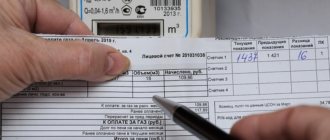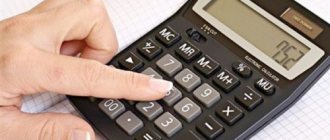Home/Utilities/Dependence of rent on the number of registered citizens
The question of whether the size of the rent depends on the number of registered people is asked by every owner who wants to register someone other than himself in his apartment. Indeed, if the answer is positive, each one registered can cost a hefty sum, especially taking into account current prices for public utility services.
What does the rent depend on?
In Art. 155 of the Housing Code of the Russian Federation states that every owner of real estate is obliged to pay for utility services no later than the 10th day of the month. The same law is also used in the process of settlement transactions in relation to payment for housing and resources provided by management companies and RSO. Practice shows that the amount of payments is commensurate with the number of services consumed. But sometimes there are no individual metering devices in the premises, so standards are established for each registered person, which are used when calculating the amount of rent.
Based on the above, it follows that the greater the number of people registered in the living space, the higher the monthly payment for utilities will be. It does not matter whether the registered persons have temporary registration or are permanently tied to the home. While their registration is current, the owner will receive bills with rent separately for all areas of services with the exception of a number of receipts (in the case of installed meters).
In practice, the total cost of rent depends on several parameters:
- quadrature (the number of square meters occupied by the apartment);
- tariff features of payment;
- number of registered persons;
- the fact of the presence of individual metering devices.
Indicators taken into account exclusively by the meter, if installed, are always applied. In this situation, payment is made for the amount of services consumed per month. However, some values are still calculated according to the number of people registered.
Special cases
Let's consider individual cases for which there are some nuances regarding payment of rent. For example, if no one is registered in the dwelling at all, or, on the contrary, they are registered, but do not live. There are often situations where the number of registered persons has decreased (due to registration in another place, due to death, etc.).
If no one is registered
There are cases when there are no registered residents in the home. However, you will still have to pay utility bills. The owner of the living space must do this. You will have to pay for garbage removal, heating and repairs of a residential building.
The presence of meters guarantees no utility costs, and, consequently, zero payments. In this situation, installing individual metering devices is very beneficial.
Registered, but no one lives
There are often situations when a person is registered at a given address, but actually has a completely different place of residence. Then the receipts will come in his name.
To pay payments only for those who actually live in the living space, you need to:
- for a person who does not live in this living space, take a certificate stating that he is a guest of housing at another address and pays his bills there;
- write an application to the housing office, as well as to all companies providing utility services, supporting it with a certificate.
After this, according to the Rules for the provision of utility services, the calculation of rent will be changed. Payments will begin to arrive with adjusted amounts.
This procedure will have to be repeated every six months, as long as the person registered in the living space lives at a different address.
Does the rent depend on the number of registered citizens?
The rent definitely depends on the number of registered people. In addition to rent, heating services are worth considering. If one citizen is registered in the premises, then he will receive a bill for a single person. If two, three, four, five are registered, then the amount of rent that was billed earlier will need to be multiplied by 2, 3, 4, 5, respectively. This applies to the following areas of utility services:
- gas;
- Electric Energy;
- cold water;
- hot water supply;
- water runoff;
- waste removal activities.
The following services, or more precisely, their cost, depend on the number of citizens who are officially registered in the apartment:
- electricity;
- gas supply;
- provision of water;
- removal of household waste.
This is stated in paragraph 2 of section. 2 of Resolution No. 354 of 05/06/2011. As for other payments, they do not depend on the number of registered citizens, i.e. they have a fixed amount.
Housing and communal services
In addition to the above factors, utilities depend on the tariffs of the housing office or the Management Company. They are included in the column “Maintenance of housing stock.” However, it does not describe individual positions; they can only be clarified at the Housing Office or the Management Company. The actual calculation of rent based on the number of residents or registered residents depends on the terms of the concluded agreement.
The only factor influencing the increase in tariffs when registering a new tenant is garbage removal.
Expert opinion
Klimov Yaroslav
More than 12 years in real estate, higher legal education (Russian Academy of Justice)
Ask a Question
There are two types of bindings - to the area of the apartment or the number of residents. In the first case, the average tariff is 2.5 rubles/m², in the second – 75 rubles. from one registered. All other indicators depend only on the area of the living space.
Normative base
The rent includes the amount that must be paid for the systematic provision of utilities. Its introduction is carried out on the basis of civil contracts, which are developed according to the classical scheme. Housing legislation imposes an obligation on apartment owners to regularly make payments for the use of utility services (Article 153 of the Housing Code of the Russian Federation).
Here is the main list of norms, laws and rules governing this point:
- Housing Code of the Russian Federation (Articles 155, 156, 158) - Federal Law No. 188 of December 29, 2004;
- by-laws – Rules for the provision of public services (government resolution No. 354 of 05/06/2011);
- Federal Law No. 261 “On Energy Saving” dated November 23, 2009
Please note:
In accordance with these standards, the responsibility for regularly paying for utility services rests with the owners and occupiers of real estate. At the very least, they are responsible for the timely repayment of debts.
Ways to influence the defaulter
It happens that the homeowner himself does not want to pay for utilities. The legislation of the Russian Federation provides for the use of the following methods of influence against a defaulter:
- Calculation of penalties on utility debt.
- Written notice of out-of-court repayment of a debt.
- Debt collection through court.
- Disabling com. resource (water, gas, heating).
Important!
When the owner does not pay the housing and communal services receipt for 6 months, the supply of utility resources may be suspended until the debt is repaid. As a result, you may lose electricity, gas or water. Heating will continue to be supplied as before.
If disconnecting utilities does not help, the resource supplying organization (MC, HOA) has the right to file a lawsuit for forced collection of debt for housing and communal services. As a result, FSSP bailiffs will seize the bank (current) accounts and property of the home owner. If the tenant does not pay the rent and the housing is provided to him under a social contract. rental, after six months such a tenant can be evicted by court decision.
How is the share of each prescribed allocated?
The conditions for the provision of utility services are fully reflected in Chapter 2 of Resolution No. 354. The share of each registered person is determined by a calculation method. However, sometimes it is problematic to identify the actual volume consumed by each resident. Therefore, the owner faces difficulties in determining the amount of money that needs to be paid for a particular family member.
Attention
It should be understood that the calculation of the share of each registered person is carried out approximately, since exact measures in this case are impossible. It is necessary to use the total amount for each device as a basis and divide it by the total number of residents and registered people. This indicator will act as a share per registered person. If you want to act even simpler, you can divide the amount reflected in the receipt among all the people who are officially registered in the home.
If the premises are equipped with personal metering devices (meters), it is difficult to determine the consumption of light, water or gas separately by each resident. Therefore, the share parameter will be only conditional (approximate). A more accurate allocation of shares occurs in a situation where meters are not installed, and rent is subject to accrual in accordance with the standards for each registered person. The total amount of rent is determined in accordance with Federal Law No. 176 of June 29, 2015 and Art. 156 Housing Code of the Russian Federation.
Practical observations
The right of ownership allows full disposal of real estate, ownership and use of it . And different persons can own and use the premises.
This right arises on the basis that the owner can provide his premises for free or paid use to third parties. And the conditions and procedure for living are specified in the rental agreement.
ATTENTION! Receipts for payment of utility services are issued to the owners; accordingly, he is responsible for it and is the legal payer.
You cannot simply force a registered person to pay utility bills. If the owner of the property wants to shift responsibility for the rent to the person registered there, then for this it is necessary to draw up an appropriate written agreement.
Dependence of the rent amount on the number of registered persons
As already mentioned, if there are no meters, the number of registered people has a direct impact on the final amount required to be paid for the apartment. That is, if at first one person was registered in the apartment, and subsequently another one was added to him, the rent will be doubled (you can find out more about the structure of fees for housing and communal services in Article 154 of the Housing Code of the Russian Federation). Only the fee for the so-called “permanent” services will remain unchanged; the volume of provision does not depend on the number of people. This includes heating and home maintenance. The calculation in this case is made on the basis of quadrature (Articles 156, 157 of the RF Housing Code).
For your information
Other types of payments do not depend at all on the number of persons registered in the premises. Also, when meters are installed, rent payments no longer depend on the number of people with registration. As a result, the list of utility payments affected by this indicator is reduced. It is the responsibility of management company employees to explain the meaning of certain payments to residents. In any receipt there are “variable” columns, the values of which depend on the number of registered persons, and there are items that have constant values.
Rental of property
The tenant can also pay for an apartment rented under a commercial lease agreement. This is possible if an agreement has been concluded and it states who is responsible for paying utility bills.
By concluding a rental agreement, the owner provides the premises with all its contents (furniture, household appliances) for use.
If the contract does not contain a separate clause that states that the tenant agrees to pay for utilities, then after signing it it is impossible to assign these obligations.
How is the calculation made?
The procedures for calculating rent are spelled out in detail in the Rules for the provision of rent - Resolution No. 354 of 05/06/2011. Much, in fact, depends not so much on the number of registered persons, but on the presence of individual accounting devices in the household. The total value also includes the cost of utilities for the general needs of the house.
IMPORTANT
In the case of personal metering devices, payment for utilities is carried out in accordance with their indicators. It is recommended to remove them from the 15th to the 25th monthly. Devices must be checked every six months. Residents are notified in advance of future visits from utility service representatives to inspect them.
If meters have not been installed, payment is made according to standards, the dimensional parameters of which are subject to determination by regional commissions. They depend on the following points:
- area of apartment property;
- the presence of certain household items - bathtubs, electric stoves, water heaters and boilers.
Recalculation can be carried out in a situation where there is a discrepancy between the readings of metering devices and the amounts paid, as well as in the absence of the payer from home for more than 5 days (Resolution No. 354 of 05/06/2011).
Recalculation procedure
The procedure for recalculating rent is determined by Decree of the Government of the Russian Federation of May 6, 2011 No. 354 in section 4. To initiate the procedure, you must follow the established rules.
The ideal scenario is to submit an application for absence before departure. It is not prohibited to notify about absence even after the tenant has returned. For this he is given 30 days. The recalculation process is carried out as follows:
- A registered citizen writes a statement with a request to recalculate the rent, indicating the existing grounds.
- The application is confirmed by official documents.
- The entire package is transferred to the accounting department of the management company or homeowners association.
- The accountant recalculates services for complete days of absence. The day of departure and arrival is not taken into account.
The overpaid amount is not returned in cash, but goes towards repayment of future payments.
Rates
The price list depends on the specific type of service and region. Let's consider each of them in more detail based on data for 2021 - the first half of 2021 for most regions and territories of the Russian Federation.
| Water (cold and hot, respectively), rub./cubic m | Gas (minimum and maximum, respectively), rub./cubic. m | Light (minimum and maximum, respectively) rub. /kW |
| 33 rub. 3 kopecks, 143 rubles. 76 kop. | 4,277 – 6,062 | 2.37 – 5.38 for houses with gas stoves |
Water
The cost depends on several factors:
- collection method;
- energy costs for this process;
- cleansing technique;
- the cost of operating pipelines;
- expenses for issuing salaries;
- heating.
Before calculation, provisions such as conducting transactions in ruble currency and including a nominal price in the rate are taken into account.
Gas
The cheapest gas is in the Chelyabinsk region, the most expensive is in the Altai Territory. Average rates around 4 rubles are set in the Nizhny Novgorod, Novosibirsk, Omsk, Sverdlovsk, and Tyumen regions. Indicator 5 r. for 1 cubic meter or more is observed in the Volgograd region, Bashkiria, Moscow, Saratov regions, r. Tatarstan, Stavropol Territory. The most expensive tariffs are observed in the Altai and Krasnodar territories.
Light
The tariff marking for electricity is regulated by Federal Law No. 261 “On Energy Saving” and numerous regional acts. The cheapest electricity services are observed in Krasnoyarsk, Saratov, Volgograd, Yekaterinburg, Izhevsk, Novosibirsk. The highest cost of light is in St. Petersburg, Moscow, Krasnodar, Volgograd.
Attention
Regulation of electricity tariffs is carried out at the regional level and is regulated by local acts, resolutions, regulations and orders, the names of which vary.
Rent structure
The rent depends on the components included in it. The only type of energy that is provided to absolutely all residential premises can be considered electricity. But heating is subject to payment only if it is provided centrally, which is not the case in all residential premises. For example, private houses can be heated with solid fuels independently, and then the payment for it is not included in the general payment. The same applies to water supply. There are apartments that do not have hot water supply; it is heated by boilers or a gas water heater. In the private sector there may not even be cold water.
If we talk about apartments, they actually always have a standard set of housing and communal services:
- Electricity.
- Gas.
- Cold and hot water.
- Heating.
But they are also calculated differently depending on the type of property rights to the premises.
In a privatized apartment
Privatized apartments are private property, so the owner and other people living on its territory are not required to pay for rent. But no one is canceling the payment for light, water, electricity. The monthly receipt consists of the following expense items:
- Maintenance of common property.
- Payment for management of an apartment building.
- Current and major repairs of the building.
- Use of the elevator.
- Heating.
- Sewerage.
- Intercom.
- Gas.
- Water.
- Electricity.
- Garbage removal.
- Cleaning the local area.
This list may include other additional cost items, for example, the cost of permanent parking spaces, etc.
Despite the fact that the residential premises were purchased by the owner and are personal property, he cannot separate himself from paying the associated fees, because the apartment is part of a residential complex.
In a municipal apartment
A municipal apartment is not considered private property; it is on the balance sheet of local governments and is, as it were, temporarily leased to residents. When moving into social premises, a rental agreement is concluded with the tenants. It is signed by the responsible tenant, and others are indicated in the agreement as co-tenants. However, both the rights and obligations of all registered persons are absolutely the same. The terms of the agreement must be observed by all residents, and failure to comply may result in eviction from the apartment.
The main difference between municipal property and your own is the obligation to pay for the use of square meters. But due to the fact that citizens living in social housing pay rent, they are exempt from paying for major repairs. But expenses for the ongoing maintenance of the apartment itself and common property, as well as their repairs, are paid at the standard rate.
Who should pay the rent?
Absolutely all service providers are involved in concluding agreements with housing companies or directly with owners. On their basis, responsibility is assigned to the owner of the premises (Article 153 of the Housing Code of the Russian Federation). Therefore, each property owner undertakes to monitor the receipt of the required amounts into the management account. In addition to this, the obligation to pay rent rests with other persons:
- tenants (if a formal agreement is concluded);
- other registered persons (relatives and family members).
Although the payment is always issued and sent to the post office in the name of the legal owner of the home. And when the bills are split, it comes to several people.
Legislation
Payment, according to the housing code, is divided into several parts:
- public utilities;
- resources consumed;
- use of the premises, if rented.
At the same time, renting premises can be both social and commercial. The owner himself decides under what conditions to trust his property. Nevertheless, no matter who uses the premises, it is necessary to pay for it and utility services.
The legislation openly dictates obligations to pay for the apartment. So, who is obliged to pay and when:
- Developer. Obliged to make payments from the time the building is put into operation until the buyer receives possession rights;
- Owner of the premises. Enters into responsibilities when ownership arises (after signing the deed of transfer of the apartment);
- The tenant of the premises from the moment the contract comes into force.
The list above does not say anything about the persons registered in a particular premises. One conclusion follows from this - the owner of the premises is responsible for the timely payment of any utilities.
The obligation to pay is established because the citizen uses the residential premises, and the management company has provided a certain service. If the owner of the premises does not pay or does so incompletely, then certain difficulties may arise in the future.
For example, when selling real estate that has debts on utility bills, a regional settlement company may sue its owner.
If registered persons refuse to pay rent
The Housing Code provides 3 main directions on how to force people registered in an apartment to pay fees:
- section of personal accounts (for relatives);
- threat of termination of registration;
- filing a claim in court (for tenants).
Note:
If you contact the fiscal authorities, the judge will oblige you to fulfill debt obligations if the owner provides evidence of the fact that there is no payment. This can be done by paying for the CG out of your own pocket and showing a document stating that you had to do it yourself.
Consequences of debt
The management company can take the following measures against persistent defaulters for utility services:
- Conduct explanatory conversations;
- Notify in writing of the existence of a debt;
- Publicly disclose lists of debtors;
- Accrue penalties;
- Disable services;
- Forcibly collect debt;
- Evict.
Penalties are calculated if the owner has not paid for services for more than a month . It is credited in the amount of 1/300 of the refinancing rate of the entire debt amount for each day of non-payment
. At the end of 90 days, the penalty increases to 1/130 of the bet. Also, after 90 days, the management company has the right to disconnect services.
The management company has the right to sue the debtor.
If a citizen is not able to prove the fact of payments, then the court will decide in favor of the Criminal Code.
Then the owner can pay off the debt on his own or the bailiffs will collect fees for it. They will seize accounts, property, and send a writ of execution to work. Sometimes the debtor is also prohibited from traveling outside the state.
If you fail to pay utility bills within six months, you may lose your right to own your home. But, if a citizen lives in his own apartment and has no other housing, then it will not be possible to evict him.
It is necessary to pay housing and communal services under any circumstances. If you have questions about the amount of payments or the sequence of transferring funds, you can always consult your management company for free.
Today it is impossible to live without modern comforts - electricity, gas, hot water delivered directly to apartments. But at the same time, you need to pay utility bills to all property owners.
If no one lives
Often, caring parents purchase housing for their growing child. It remains empty for a long time, waiting for its owner, although a child may already be registered there. In this situation, it is unlikely that you will be able to avoid making payments at all. After all, heating and maintenance of housing will be carried out by public utilities in any case. The only way out is to install meters for gas, electricity, and water. Since there will be no consumption of the resource, no payment will follow. And the remaining services will have to be compensated in accordance with Art. 153 Housing Code of the Russian Federation.
Recalculation of rent
Rent can be recalculated:
- At the initiative of the management company.
- According to the owner of the apartment.
- As prescribed by regulatory authorities.
The tenant himself can influence the first and last points only indirectly. For example, people at a general meeting determined that the tariffs established by the management company or HOA do not comply with legal standards. They can address their complaints directly to the manager and resolve the problem on the spot. If the issue cannot be resolved at this level, then you can file complaints with the regulatory authorities. Inspection of the activities of management companies may also be caused by other aspects.
Recalculation of rent can be initiated by the owner of the residential premises himself, if he and other household members were absent from the apartment for a long time and, accordingly, did not use any services and benefits.
Conditions
Recalculation of already accrued amounts can be made downwards or upwards. When the initiative comes from the owner himself, we are talking, of course, about reducing the rent. The basis for this may be:
- Absence of all registered persons or any part of them from the premises for more than five days in a row.
- Receiving a subsidy. We are talking about cases where the family income is below the subsistence level. On this basis, the amount of utility payments may be reduced.
- Fixation of interruptions in the supply of services or their quality differed significantly from the proper one.
In each indicated case, it is necessary not only to write a statement and justify your request, but also to confirm what was written with documents.
When recalculation is not possible
You can recalculate the amount of already accrued services using the following indicators:
- Waste removal.
- Hot and cold water supply.
- Use of sewerage.
- Gas supply.
- Heating water.
Please note that water and gas are counted only if meters are not installed on them.
At the same time, apartment owners who have not installed water meters cannot apply for recalculation of this service. We are talking only about those residential premises that have documentary evidence that there is no technical ability to install metering devices.
Heating, funds for major and current repairs, cleaning of the local area and entrances cannot be recalculated on the basis of temporary residence in the apartment.
There is no point in counting on a recount even if no documentary evidence is provided for the reasons given in the application. Then the amounts in payments will not change.
If no one is registered
Sometimes there are situations when a person is registered in one apartment, but lives in another. In order to pay utilities exclusively for those people who actually live in the apartment, although they are not registered in it, it is necessary to obtain a certificate of place of residence. In this case, the fee will be increased not for the “unowned” apartment, but for the actual place of housing. Along with this, it is required to write an application to the management companies, after which payments will be received in edited form. Providing such a certificate is required once every six months.
If the number of inhabitants has decreased
Information about changes in the number of residents does not always reach the management company or housing office in a timely manner. Therefore, they can continue to charge payments for more residents than are actually living at the moment. To stop charging excess payments, you need to write a statement to the utility billing company.
Such a document is issued in the name of the head of the responsible organization. The following documents must be attached to the application:
- a certificate confirming the person’s discharge from the apartment;
- information on accrued payments for the previous month;
- title document for the apartment.
You must also have your personal passport with you. If you are illegally denied a recalculation, you have the right to file an application with the court demanding a recalculation.
Who pays the tenant or the landlord?
If the landlord must pay, then he contributes money for the housing and communal services receipts sent. It happens like this: after concluding a rental contract, payments are sent to his address, which he will repay in any way convenient for him.
When a tenant is required to pay utility bills, this is documented in the appropriate property lease contract. Both parties to the contract agree that the tenant draws up an agreement with the management company, as a result of which payment documents will be sent to the landlord. The latter will deduct payments for housing and communal services from the cost of renting an apartment.
In the latter option, all responsibilities for timely payment of housing and communal services receipts are assigned to the tenant, but there is no need to draw up a contract with the management company. This is done in a slightly different way: the employer pays, and then presents the landlord with an invoice.
The person does not live in an apartment
There are cases when the persons who own the premises are not in the apartment for a long time. In such a situation, they use recalculation
. The purpose of this financial transaction is that the costs of operating the premises are calculated using electronic metering devices for the absent person.
When ownership is shared, this procedure is performed based on the proportional size of the share. Such recalculation is not carried out for all services, but only for electricity, gas and water.
.
Rents are also recalculated in the absence of metering devices
.
To do this, you need a free form application from the owners
. You need to collect for it:
- certificate of stay in another place;
- bills for utility costs in another room.
Original receipts are not required; photocopies are provided.











